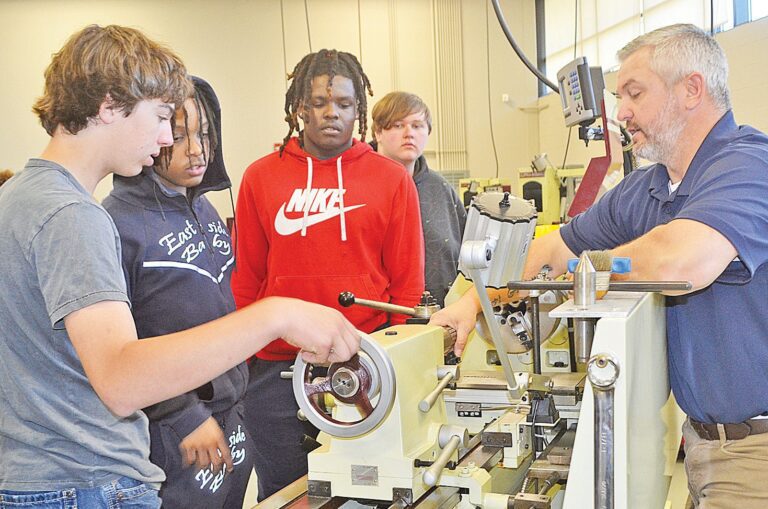SCC Encourages Successful Machine Tool Program
March 30, 2022
Gaffney Ledger2022

View article on GaffneyLedger.com
Garrett Brown punches coordinates into a computer numerical control milling machine, giving instructions to a robotic arm that cuts a metal block into a precise shape.
It could become anything from an electrical outlet to a medical screw used to bolt a fishing boat.
The state of the art machine tool equipment inside the Center of Advanced Manufacturing training facility has sat largely idle for the past two years at the local Spartanburg Community College campus.
Brown, SCC machine tool technology program director, worked to change this Friday at a “Machine Tool Day” with help from machine tool instructor Brian Yarborough. They met with high school students from Institute of Innovation, Daniel Morgan and Swofford career centers in Cherokee and Spartanburg counties.
There is an outdated perception of what a machinist job really involves.
While many people think it’s dark and dirty work, the machine tool area looks more like a clean scientific lab than a traditional factory floor. Students take precise measurements and learn how to program highly automated computer numerical control (CNC) machines to make machine parts much finer than the width of a human hair.
A machine tool operator can start out at a $50,000 salary and make a six figure salary after several years of experience.
“This is one of those trades where everything involves programming or making machine parts with your hands,” Brown said. “A student can earn a machine tool certificate in three semesters.. Just in the past month, I’ve gotten calls from six companies looking to hire machinists. There are plenty of jobs available. We just don’t have the workers. This is something we want to change.”
About 5 million fewer Americans are employed in manufacturing today compared to 20 years ago.
The machine tool program is not as well known among high school students as the welding and mechatronic classes currently filled on SCC’s Cherokee County campus.
Almost every student raised their hands when asked Friday if they enjoyed working with their hands.
Few students knew machine tool classes can lead to career opportunities as a machinist, tool and die maker, CNC operator and quality control inspector.
Community colleges and high school career centers are among the few places where students can learn these skills.
Yarborough sees another benefit beyond just investing in the next generation of manufacturing workers.
“You can learn a skill that will stick with you for the rest of your life,” Yarborough told the high school students. “You will make good money and will always be able to get a job that will put food on the table for your family.”